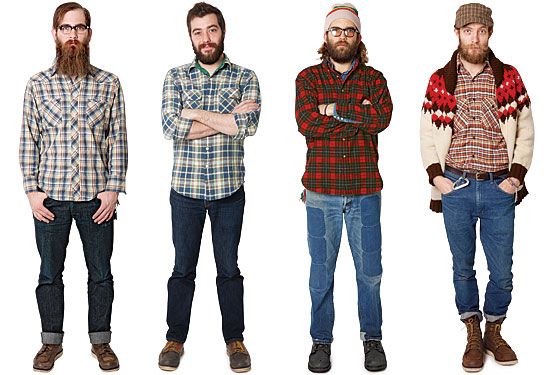Monday

The Urban Woodsman
Alright, I have a little secret: I enjoy the fashion pages of New York magazine, as well as the fashion issues of Forbes magazine. I never spend more than five minutes on either, mind you, but those five minutes are normally pretty satisfying. I, for instance, often see outlandishly-priced stuff that I wouldn't wear if you paid me, with the result that I can feel smugly self-satisfied at my fashionable frugality. Sometimes I see stuff that actually appeals to me or that my daughter might like. And sometimes I see bizarre stuff that makes me laugh.
I found the latter in the February 8th issue of New York magazine: The Urban Woodman. What's an Urban Woodman? It's a guy who lives in NYC but wants to look like he lives in the Upper Peninsula . . . Michigan's UP, where people are scarce but flannel plenty, where the dialect is just a little different, where people talk about seceding from the Michigan Union and joining Wisconsin or forming the 51st state ("Superior" is the name the segregationalists have chosen), where hunting and fishing aren't ways of life: they are life.
Of course, NYM didn't phrase it that way. They emphasized the NYC angle, and it's pretty humorous. After first noting that the metrosexual is, thankfully, dead, it described the new creature on NY sidewalks:
[A] new breed of beastly, poorly pedicured man has emerged. You can identify him by the thick woolens, canvases, and animal skins he wears, as well as by his artfully unkempt beard, all of which signal: “I'm not from around here.” But Pendleton jackets and facial hair are only part of it. The true urban hillbilly must know how to do things–like band-saw his own workbench, cure his own meats, quickly disassemble a downed tree into firewood for the whole block. For this, he needs serious gear–an ax, maybe an arc welder and, because you never know, a shotgun under the bed. This movement was gathering force well before the financial crisis, but the dicey climate has intensified and mainstreamed it.
The editors, of course, see the humor: These guys are in New York City! You can't be a woodsman in NYC anymore than I can be sophisticated urban intellectual in semi-rural Michigan. I've met a few people in my county that fancy they're urban intellectuals, but they're not. They might be intelligent and well-read, yes, but they're not intellectuals, much less urban ones, because intellectual implies a measure of (often affected) sophistication that would recoil at living in a semi-rural area.
Anyway, you can't be a rifleman unless you can lay out a deer at 100 yards, but there's a rifle range at 5th and Twentieth. Similarly, you can't be a woodsman where there are no woods to cut down, but there's an ax store in lower Manhattan. Customers aren't hacking down trees with the axes, though. They're chopping up IKEA furniture and intruders: "One of our customers bought it for her girlfriend so she could chop up some old Ikea furniture. And while I don't encourage using it as a weapon, it'll give you comfort when a stranger knocks at your door."
So what do I make of it? Do I see a more-profound meaning behind the flannel and boots, perhaps a statement about national angst? Is the flannel a companion phenomenon of the sudden popularity of survivalist blogs? Naw. That might be part of it, of course. Maybe the willingness to wear flannel makes people feel like they're ready for anything . . . albeit from the comforts of their mid-town Manhattan apartment. But overall, it's just the same old: another fashion statement. What triggers the fashions (Fifth Avenue manipulation? Genuine change in our collective cultural psychology?), I can't say.
But it is humorous.
